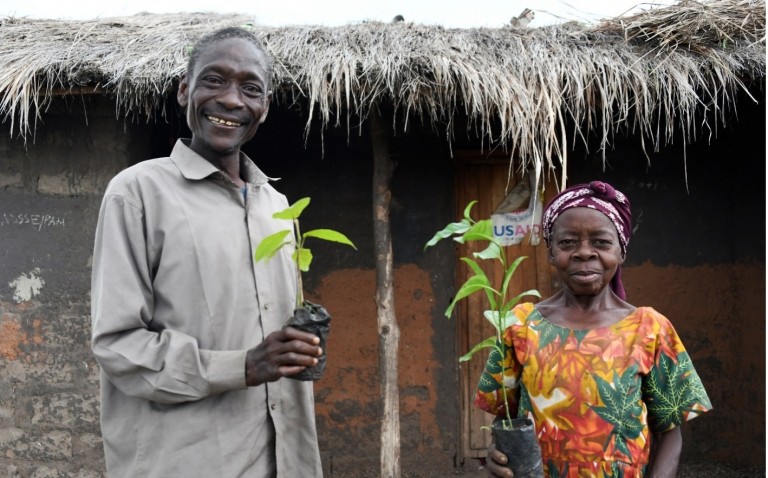Blog
To foster secure, democratic societies, Pact builds peace with conflict-affected communities

Conflict affects millions of people around the world, and preventing and mitigating violence is often the first step many vulnerable communities must take on the road to stability and prosperity. Durable peace is a foundation for development – it enables conditions for economic growth, quality public services such as health care and education, and effective governance systems. With this understanding, Pact partners with affected communities to identify and address root causes of conflict and violence. Our programs analyze and reinforce shared interests that incentivize peace, and we work with governments, civil society and communities to build responsive, resilient institutions and mechanisms for advancing peace. Our peacebuilding work takes place largely in the Horn of Africa and Central Africa.
This programming is part of our global governance portfolio, which works to foster democratic societies around the world. In addition to peacebuilding, Pact’s governance portfolio focuses on civil society strengthening and civic engagement, bolstering local governance and social accountability, human rights and equality, and more. Learn more in this Q&A with Pact’s governance and peacebuilding experts.
Why is peacebuilding so critical in global development?
Peace is the starting point and a cornerstone for any future progress. Around the world, we have seen examples of conflict wiping out gains that communities have made in economics, health, education, gender equality, environmental responsibility and more. We include our peacebuilding efforts in our governance portfolio because it is an absolute necessity for effective democracy. To participate in civic life and to lead development, citizens must have basic safety and security.
What is Pact’s approach to peacebuilding?
Peacebuilding is a long-term and collaborative process that involves enabling societies to manage their differences without conflict and shifting attitudes and norms that drive violence. Our work focuses on addressing root causes of violence, incentivizing joint action planning and collaborating with a range of stakeholders to building lasting systems for maintaining peace. Pact works through and empowers local peace champions – including civil society organizations and individual activists – to create, lead and manage multifaceted peace initiatives, while strengthening structures and institutions that are capable of mitigating, responding to and resolving conflict.
Where possible, we also closely integrate our peacebuilding efforts in programming that advances health, livelihoods and additional development outcomes. For example, the Tanganyika Conflict Mitigation and Resolution (TCMR) project in Democratic Republic of Congo (DRC) works through and strengthens local peace committees to advance additional community-led initiatives focused on natural resource management, livelihoods development and access to health care.
What are some key interventions Pact uses in peacebuilding?
Our expertise includes supporting partners and communities to advance inclusive dialogues and joint action planning, prioritizing youth and women’s peacebuilding efforts, contextualizing and training communities to access trauma healing curriculums, economic empowerment for resilience and peace, and conflict-sensitive development programming. The Mobilizing and Enhancing Local Actors for Peace (MELA Peace) project in Ethiopia advanced a number of these strategies. The project supported local communities to organize dialogues, design and advance joint action plans to address needs like deteriorated roads and rising crime rates, identify and train trauma healing facilitators to lead community healing sessions, and engage a range of stakeholders including youth and women to create and disseminate peacebuilding messaging.
We prioritize building trust and legitimacy with civic actors and community members. We work at the local, national and regional levels, and we collaborate with formal and informal peace and conflict actors.
Pact has significant experience using applied research, assessments and learning to inform adaptive programming and respond to conflict dynamics. In Ethiopia and elsewhere, for example, we have used methods like Applied Political Economy Analysis to understand the drivers of conflict and map the political and economic incentives that influence the behavior of key actors. This approach allows Pact to identify the right peace champions and develop context-appropriate strategies for engaging diverse stakeholders.
How can peacebuilding work also advance livelihoods and health outcomes?
Competition for finite resources and an inability to meet basic needs are key drivers in many conflicts. Pact implements a range of community-based natural resource management programs that support improved governance and co-management of shared resources. We support partners to organize and advance dialogues that can address land and resource-based disputes.
We also foster sustainable livelihoods – and often support conflict-affected communities to come together through income-generating activities, such as farming. Conflict often destroys homes and farms. We help communities gain resources and skills to rebuild and to produce food, income and jobs so that secure, stable futures are possible. We support communities exiting periods of conflict to invest in “peace dividends,” typically small-scale projects that allow communities to advance local infrastructure and economic development outcomes during times of peace.
What additional strategies does Pact use to build peaceful, democratic societies?
Working in more than a dozen countries, Pact's governance programming is both empowering civic change agents and strengthening public sector actors so that government institutions from the local to national level are ready to respond to citizens’ needs, deliver quality services and effectively manage public resources. Our strategies and approaches focus at the point of engagement between communities and local authorities. All of our governance interventions are fundamentally aimed at connecting citizens to public decision-making processes that have a deep effect on their lives and wellbeing. To operate in challenging contexts, often marked by political closure, fragility or conflict, we use flexible, adaptive programming.
Pact leads the global CSM-STAND project, along with IREX, which is building civil society and independent media capacity and leadership to constructively engage in civic space, as well as providing the democracy, rights and governance sector with cutting-edge technical resources and adaptable program options.